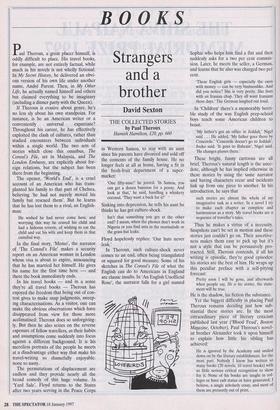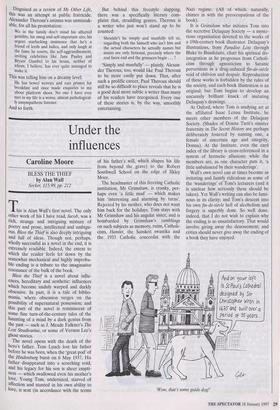BOOKS
Strangers and a brother
David Sexton
THE COLLECTED STORIES by Paul Theroux Hamish Hamilton, £20, pp. 660 Paul Theroux, a great placer himself, is oddly difficult to place. His travel books, for example, are not entirely factual, while much in his novels is not wholly fictional. In My Secret History, he delivered an obvi- ous version of his own life under another name, Andre Parent. Then, in My Other Life, he actually named himself and others but claimed everything to be imaginary (including a dinner party with the Queen).
If Theroux is evasive about genre, he's no less sly about his own standpoint. For instance, is he an American writer or a conveniently universal expatriate? Throughout his career, he has effectively exploited the clash of cultures, rather than studied encounters between individuals within a single world. The two sets of stories which close this omnibus, The Consul's File, set in Malaysia, and The London Embassy, are explicitly about for- eign relations, but the subject has been there from the beginning.
The opener, World's End', is a cruel account of an American who has trans- planted his family to that part of Chelsea, believing 'he had not merely moved his family but rescued them'. But he learns that he has lost them to a rival, an English- man:
He wished he had never come here, and worrying this way he craved his child and had a hideous reverie, of wishing to eat the child and eat his wife and keep them in that cannibal way.
In the final story, 'Memo', the narrator of 'The Consul's File' makes a security report on an American woman in London whose visa is about to expire, announcing that he has married her himself. He gives his name for the first time here — and there the book immediately ends.
In his travel books — and in a sense they're all travel books — Theroux has enjoyed the freedom that being out of con- text gives to make snap judgments, sweep- ing characterisations. As a visitor, one can make the obvious observations which have disappeared from view for those more acclimatised: Theroux does so unforgiving- ly. But then he also seizes on the reverse exposure of fellow travellers, as their habits and assumptions come suddenly into focus against a different background. It is his merciless portraits of the people he meets at a disadvantage either way that make his travel-writing so shamefully enjoyable: none so nasty.
The permutations of displacement are endless and they provide nearly all the broad comedy of this huge volume. In 'Yard Sale', Floyd returns to the States after two years serving in the Peace Corps in Western Samoa, to stay with an aunt since his parents have divorced and sold off the contents of the family house. He no longer feels at all at home, having a fit in the fresh-fruit department of a super- market:
'One fifty-nine!' he jeered. 'In Samoa, you can get a dozen bananas for a penny. And look at that,' he said, handling a whiskery coconut. 'They want a buck for it!'
Sinking into depression, he tells his aunt he thinks he has got culture-shock.
Isn't that something you get at the other end? I mean, when the phones don't work in Nigeria or you find ants in the marmalade or the grass but leaks.
Floyd hopelessly replies: 'Our huts never leak.'
In Theroux, such culture-shock never comes to an end, often being triangulated or squared for good measure. Some of his sketches in The Consul's File of what the English can do to Americans in England are classic insults. In 'An English Unofficial Rose', the narrator falls for a girl named Sophie who helps him find a flat and then suddenly asks for a two per cent commis- sion. Later, he meets the seller, a German, and learns that he also was charged two per cent.
`These English girls — especially the ones with money — can be very businesslike. And did you notice? She is very pretty. She lives with an Iranian chap. They all want Iranians these days.' The German laughed out loud.
In 'Children' there's a memorably horri- ble study of the way English prep-school boys teach some American children to boast.
'My father's got an office in Jeddah,' Nigel said . . . He added, 'My father goes there by Concorde.' Concorde doesn't go to Jeddah', Jocko said. 'It goes to Bahrain', Nigel said. 'He changes planes there.'
These bright, funny cartoons are all brief, Theroux's natural length is the anec- dote, although he has implied otherwise in these stories by using the same narrator and having characters recur and incidents link up from one piece to another. In his introduction, he says that
such stories are almost the whole of my imaginative task as a writer. In a novel I try to make each chapter as complete and harmonious as a story. My travel books are a sequence of traveller's tales.
Thus he makes a virtue of a necessity. Snapshots can't be set in motion and these stories just couldn't go on. Their assertive- ness makes them easy to pick up but it's not a style that can be persuasively pro- tracted. Still, Theroux contends, if all his writing is episodic, they're good episodes: his stories are the best of him. He wraps up this peculiar preface with a self-pitying forecast:
Pretty soon I will be gone, and afterwards when people say, He is his stories, the state- ment will be true.
He is the shadow, his fiction the substance.
Yet the biggest difficulty in placing Paul Theroux remains deciding just how sub- stantial these stories are. In the most extraordinary piece of literary criticism published last year ('Blood Feud', Boston Magazine, October), Paul Theroux's novel- ist brother Alexander took it upon himself to explain how little his sibling has achieved:
He is ignored by the Academy and smiled down on by the literary establishment, for the most part. Nobody I know has written so many books (20 novels, 10 travel books) with so little serious critical recognition to show for it. None of his books are taught in col- leges or have cult status or have generated, I believe, a single scholarly essay, and most of them are presently out of print.
Disguised as a review of My Other Life, this was an attempt at public fratricide. Alexander Theroux's animus was unmistak- able, for all his protestation:
We in the family don't mind his affected gentility, his smug and self-important airs, his urgent starfucicing insistence that he's a friend of lords and ladies, and only laugh at the fame he courts, the self-aggrandisement, inviting celebrities like Jane Pauley and Bryant Gumbel to his house, neither of whom, I believe, has ever quite managed to make it.
This was telling him on a dreamy level: He has bowel worries and eats prunes for breakfast and once made enquiries to me about platform shoes. No one I have ever met in my life is a worse, almost pathological- ly unsympathetic listener. , And so forth. But behind this freestyle slapping, there was a specifically literary com- plaint that, straddling genres, Theroux is a writer who just won't stand up to be counted:
Shouldn't he simply and manfully tell us, regarding both the himself who isn't him and the actual characters he actually names but insists are only fictional, precisely where the real faces end and the grimaces begin ?
`Simply and manfully' — plainly, Alexan- der Theroux, too, would like Paul Theroux to be more easily put down. That, after such a prolific career, Paul Theroux should still be so difficult to place reveals that he is a good deal more subtle a writer than many of his readers have recognised. Every one of these stories is, by the way, smoothly entertaining.



























































 Previous page
Previous page